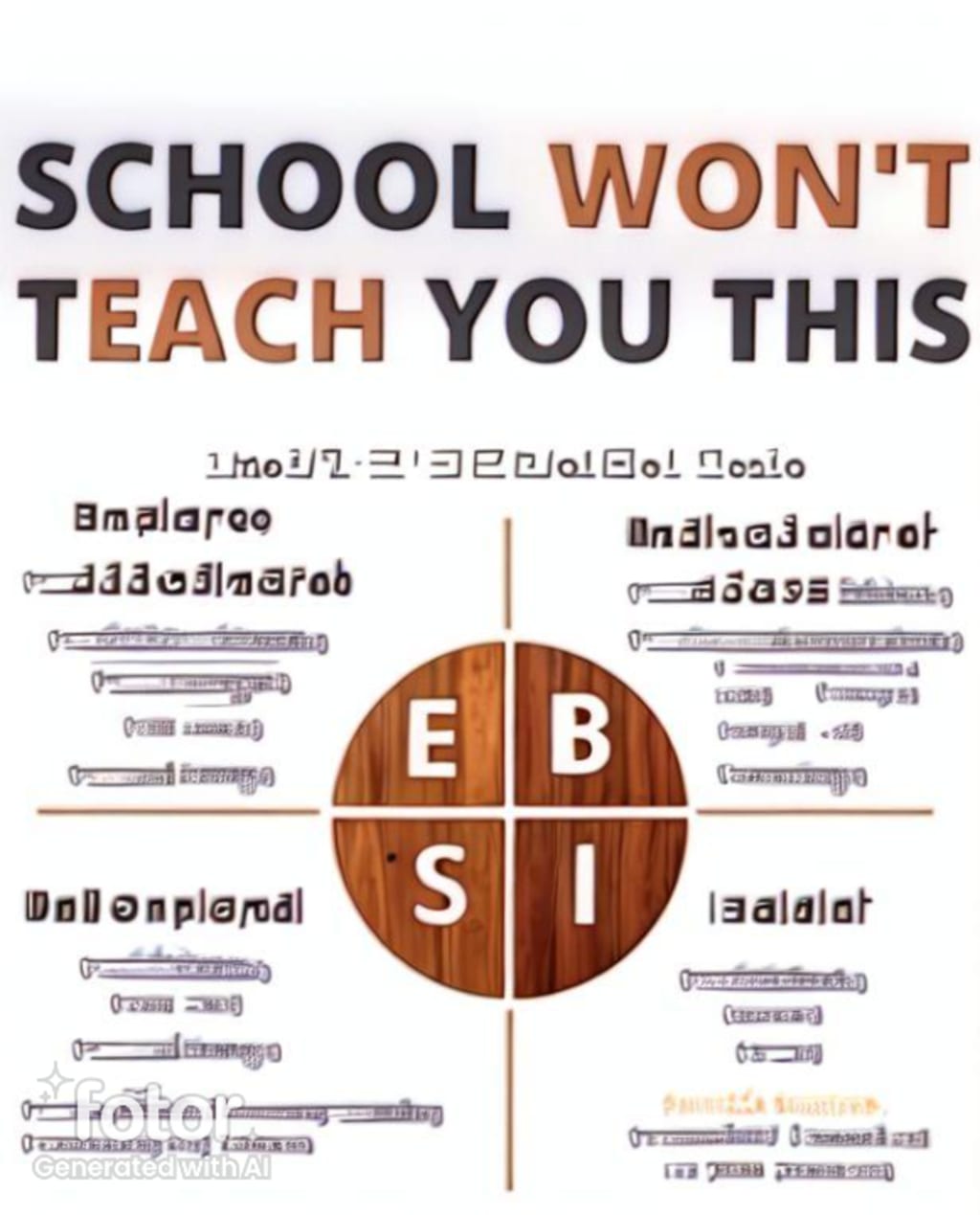schools won't teach you this
Beyond the Classroom: Essential Life Lessons Schools Won't Teach You

**Schools Won't Teach You This: Essential Life Lessons Beyond the Classroom**
Education is the cornerstone of personal and professional development. Schools are designed to equip us with knowledge in subjects like math, science, literature, and history. However, there are crucial life lessons and skills that traditional education systems often overlook. These lessons are essential for navigating the complexities of adult life and achieving personal success. Let's delve into some of these overlooked areas and why they matter.
### 1. Financial Literacy
Understanding money management is vital, yet many leave school without basic financial knowledge. Here are a few critical components of financial literacy that aren't typically covered in depth:
- **Budgeting**: Knowing how to create and stick to a budget is crucial for financial stability.
- **Investing**: Understanding the basics of investing can lead to significant long-term benefits.
- **Taxes**: Many young adults are unaware of how taxes work until they face them head-on.
### 2. Emotional Intelligence
Emotional intelligence (EQ) is the ability to recognize, understand, and manage our own emotions, and to recognize, understand, and influence the emotions of others. High EQ is linked to better relationships and success in both personal and professional arenas. Schools focus on IQ, but EQ is equally important.
- **Self-awareness**: Recognizing your emotions and their impact.
- **Self-regulation**: Managing your emotions in healthy ways.
- **Empathy**: Understanding and sharing the feelings of others.
### 3. Critical Thinking and Problem Solving
While schools teach subjects that require critical thinking, they often don't teach the process itself. Being able to think critically and solve problems effectively is a skill that can be applied to any area of life.
- **Questioning assumptions**: Don't accept things at face value.
- **Analyzing information**: Look at data and evidence before making decisions.
- **Creative solutions**: Think outside the box to solve problems.
### 4. Interpersonal Skills
Success in life often depends on how well we interact with others. These skills are essential in personal relationships and professional settings.
- **Communication**: Clearly expressing thoughts and ideas.
- **Active listening**: Fully concentrating, understanding, responding, and remembering what the other person is saying.
- **Conflict resolution**: Navigating disagreements in a constructive manner.
### 5. Self-Care and Mental Health
Schools may touch on physical education, but mental health and self-care are often neglected. Understanding how to take care of your mental well-being is crucial for a balanced life.
- **Stress management**: Techniques to handle stress effectively.
- **Mindfulness and meditation**: Practices to maintain mental clarity and calm.
- **Healthy boundaries**: Knowing when to say no and prioritize your own needs.
### 6. Time Management
Effectively managing time can be the difference between success and failure. Schools give assignments with deadlines, but they don't always teach how to manage those deadlines alongside other responsibilities.
- **Prioritization**: Determining what tasks are most important.
- **Scheduling**: Planning your day to make the most of your time.
- **Avoiding procrastination**: Strategies to stay focused and productive.
### 7. Basic Household Skills
From cooking to basic home repairs, these are the skills that keep your daily life running smoothly. Home economics classes are rare, and many students graduate without these essential skills.
- **Cooking**: Basic cooking skills to maintain a healthy diet.
- **Cleaning and maintenance**: Keeping your living space in good condition.
- **DIY repairs**: Simple fixes that save money and time.
### 8. Understanding Contracts and Legalities
Life is full of legal documents—from rental agreements to job contracts. Understanding the basics of these documents is crucial to avoid being taken advantage of.
- **Reading contracts**: Knowing what to look for and what it means.
- **Negotiation skills**: Ensuring you get the best possible terms.
- **Legal rights**: Understanding your rights in different situations.
### Conclusion
While schools provide a foundation of knowledge, the real-world skills that truly make a difference in life often fall outside the curriculum. Taking the initiative to learn these skills on your own can lead to a more successful, balanced, and fulfilling life. Whether through self-study, workshops, or seeking advice from experienced individuals, these lessons are indispensable.
Remember, education doesn’t stop at graduation. Lifelong learning is the key to staying adaptable and resilient in an ever-changing world. So, take charge of your education and fill in the gaps that school left behind. Your future self will thank you.
**Unlocking Success with Emotional Intelligence: Why EQ Matters More Than Ever**
In a world that increasingly values intelligence and technical skills, another crucial factor often gets overlooked: Emotional Intelligence (EQ). While traditional intelligence (IQ) is important, EQ can be the defining factor between mere competence and true excellence in both personal and professional realms. Understanding and developing your EQ can transform your interactions, improve your relationships, and enhance your overall quality of life. Let's explore why emotional intelligence matters and how you can cultivate it.
### What is Emotional Intelligence?
Emotional intelligence is the ability to recognize, understand, manage, and effectively use your own emotions and those of others. It comprises several key components:
1. **Self-Awareness**: Recognizing and understanding your own emotions.
2. **Self-Regulation**: Managing your emotions in a healthy way.
3. **Motivation**: Using your emotions to stay focused and driven.
4. **Empathy**: Understanding and sharing the feelings of others.
5. **Social Skills**: Managing relationships to move people in desired directions.
### Why EQ Matters
#### 1. **Enhanced Relationships**
Strong emotional intelligence helps you navigate social complexities and build deeper, more meaningful relationships. When you understand and manage your own emotions, you're better equipped to understand and influence the emotions of others, leading to healthier and more productive interactions.
#### 2. **Improved Communication**
EQ improves your ability to communicate effectively. By being attuned to your own emotions and those of others, you can tailor your communication style to fit the context and audience, ensuring that your message is received and understood as intended.
#### 3. **Better Leadership**
Leaders with high emotional intelligence are often more effective. They can inspire and motivate their teams, manage stress, defuse conflicts, and maintain a positive workplace environment. Such leaders are not only respected but also trusted by their teams.
#### 4. **Increased Resilience**
Life is full of challenges and setbacks. Emotional intelligence provides the tools to cope with stress and adversity, bounce back from failures, and maintain a positive outlook. This resilience is key to long-term success and well-being.
#### 5. **Enhanced Decision-Making**
High EQ helps you make better decisions by integrating emotional information with rational thought. This balanced approach leads to more thoughtful, informed, and empathetic decision-making processes.
### Developing Your Emotional Intelligence
While some aspects of EQ might come naturally, many can be cultivated through intentional practice and self-reflection. Here are some strategies to enhance your emotional intelligence:
#### 1. **Practice Self-Awareness**
- **Reflect on your emotions**: Regularly take time to consider what you’re feeling and why.
- **Keep a journal**: Writing about your experiences and emotions can help you understand patterns in your behavior.
- **Seek feedback**: Ask friends or colleagues how they perceive your emotional responses.
#### 2. **Improve Self-Regulation**
- **Mindfulness and meditation**: These practices help you stay present and manage your emotions more effectively.
- **Pause before reacting**: Take a moment to consider your response rather than reacting impulsively.
- **Develop healthy coping mechanisms**: Find activities that help you manage stress, such as exercise, hobbies, or talking to a friend.
#### 3. **Cultivate Motivation**
- **Set personal goals**: Clear, meaningful goals can drive you to improve.
- **Stay positive**: Focus on positive outcomes and learn from setbacks rather than dwelling on failures.
- **Find intrinsic rewards**: Engage in activities that are personally fulfilling and align with your values.
#### 4. **Enhance Empathy**
- **Active listening**: Pay full attention to the speaker, show interest, and provide feedback.
- **Observe non-verbal cues**: Body language, facial expressions, and tone of voice can provide valuable insights into others’ emotions.
- **Put yourself in others' shoes**: Try to see situations from their perspective to better understand their feelings and motivations.
#### 5. **Develop Social Skills**
- **Improve communication**: Practice clear, assertive, and respectful communication.
- **Build rapport**: Find common ground and build connections with others.
- **Resolve conflicts**: Address issues directly and constructively, seeking win-win solutions.
### Conclusion
In today's interconnected and fast-paced world, emotional intelligence is more important than ever. It goes beyond mere technical skills or intellectual prowess, providing a foundation for deeper connections, effective leadership, and personal resilience. By actively working to develop your EQ, you open doors to greater success and fulfillment in all areas of your life. Remember, like any skill, emotional intelligence can be learned and refined with practice and dedication. Start your journey today and experience the transformative power of emotional intelligence.
About the Creator
peter
Content about cars, motorbikes, technology, news
Enjoyed the story? Support the Creator.
Subscribe for free to receive all their stories in your feed. You could also pledge your support or give them a one-off tip, letting them know you appreciate their work.






Comments
There are no comments for this story
Be the first to respond and start the conversation.